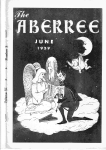A Book Editor Looks Back (continued) / Pulyan (cont'd) / Auditorial (cont'd)
stated in their contributions, it was the fanaticism of the first years that threw everyone so badly. The imbalances of all the early schools were the product of the turmoils of the individuals who came flocking to them en masse, spreading the wild contagions of insanity.
The writer spent a few months in Wichita himself and saw the situation get out of hand there, for the second time, less than a year after it had been generously and most capably established at Wichita by the help and efforts of a successful business man of the community, who no longer wishes to be identified in the field.
Hart has adequately described the general tone and pace of Wichita just about the time critical mass was reached, and the resultant fission scattered would-be auditors to the four winds.
This writer has only one addenda to Hart's article -- that the first to recognize that the trolley was irrevocably off the track, and to take the drastic measures needed to break out of the encroaching quicksands of magnified folly, was the much-maligned L. Ron Hubbard. It is a testament to the man's own good judgment and courage to defy the furies of irrational censure that he did get out and get away.
Then came the brief interlude of what was known as "Hubbard College" in rivalry with the old Foundation, but "We the People" were finally too much for both institutions and they both fell in spite of dedicated efforts of a few fine, sane, otherwise immensely successful people in the management levels of both, and subsequent, organizations.
Hubbard again had the audacity to break out of the circle of encroaching "squirrels" in Phoenix who threw a monkey-wrench into a very well managed central organization -- and he did it again and again -- once more in Phoenix -- in Philadelphia -- in England -- until, at last, as the furies lessened and the screwballs all drifted into their successive pursuits, still looking for the Magic Pill, there came the time of settling in Washington, D.C., where the central organization of several stable years has now begun to supply a reputable core of competent auditors to those in need of professional help, and a steady supply of good data and advice to the workers in the field who are still interested in improving their own lot in life, tho not particularly out to save mankind from encroaching folly.
This brings us, historically, sort of, up to 1959, and so ends the series -- except that one other odd facet to all this has still not been explored. This concerns, not the ambitious and hopeful auditor, but the results of his actions, seen in retrospect over the eight years "since". In a couple months, if enough readers are interested to write in about it, maybe we can put together one more chapter -- on case histories -- not about any persons in the "game", only reports on persons who got something of a definite and positive nature out of their contact with Dianetics in the first two years, and have since continued on their way, for better or worse.
With some people, the badge of advancing years seems to be a frozen sour look.
Unions, like onions, bring painful tears to those who like them strong and raw.
ALFRED R. PULYAN
(continued from page 4)
ally. One day the last weed is gone from his garden and he is surprised to find he has no further questions.
Do not think that this is all a mental exercise. It involves the whole organism, body and mind. It is a criticism of Zen that this feature is not stressed at all. In Subud, remarkable cures have occurred and readers may remember another great man who went about doing good -- he could not avoid it. People will not flock for enlightenment, but will try anything to cure a so-called chronic condition.
What happens to the student after his experience has matured? It becomes the most natural thing in the world. He may say, like Gautama, that he has done nothing at all. It is true that he has "done" nothing, but he does know by actual experience what our human situation really is.
There is much difference between experience and words. You are welcome to laugh at my words. I do not think you would laugh at the experience.
Do not find this article too disturbing. You will find that God is both "open" and loving -- devastatingly, almost unbearably, so.
If you should find that the thought of God is constantly in your mind, do not try to remove it; it can be very unsettling. Welcome it and in time it will seem supremely right.
AUDITORIAL
(continued from page 2)
own way. And on the fears their propaganda engenders, National and State budgets are unbalanced, inflation is unleashed, and the people's muttering almost muffles the hate-mongers. Almost -- but not quite. Not by 40 billions or so.
If some dictator planned an easy victory, he could have chosen no better agency than our own Pentagon to carry out his policy of: "Keep them off-balance: when they've been driven to apathy by fear; just say 'Bool' and take over."
But we don't believe the descendants of the Boston "tea party" are going to trade their "need" for a second and third car for the right to kneel before an acre of gold braid. If Congressmen can't separate themselves long enough from their plush chairs to see the heads of the people over the heads of the hand-out brigade, maybe we need bigger Congressmen. Or, maybe the "little men" now in Washington would read some banners if we held them high enough.
Suppose we start with: "Over-fed jackasses get colic, and neither plow nor race."
The tragedy is, this can apply to the man behind the plow, or the rider, too.


